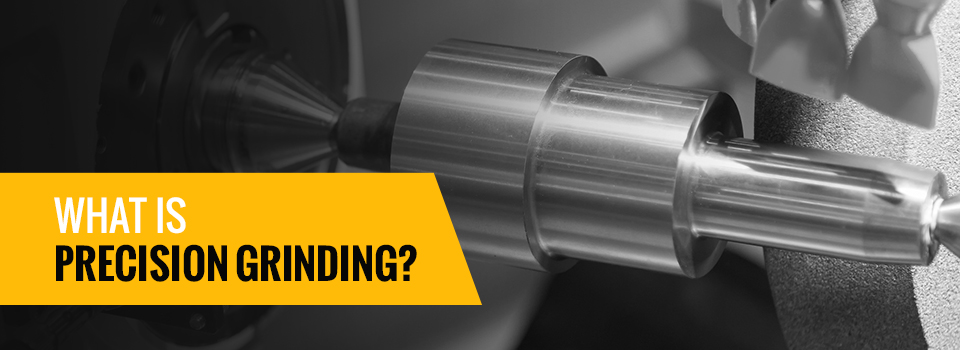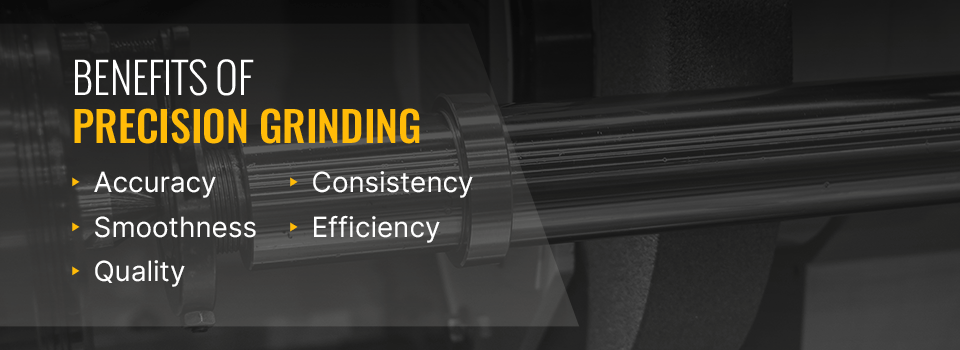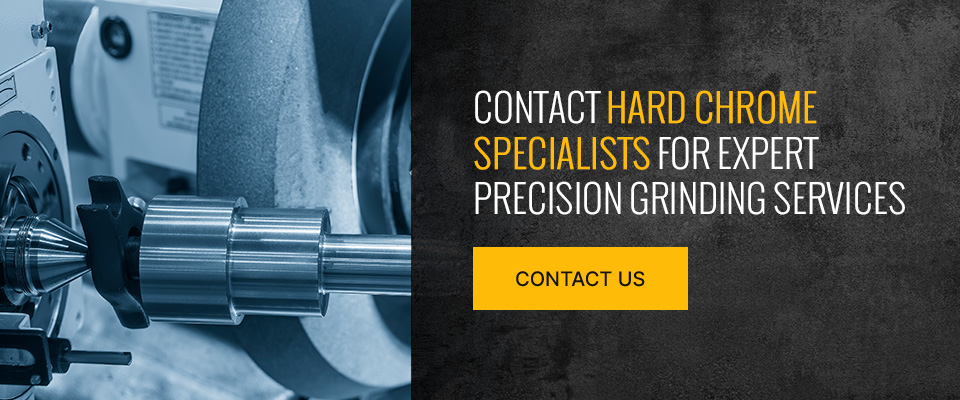What Is Precision Grinding?

Precision grinding is a manufacturing process that involves the removal of material and impurities from small and large workpieces using abrasive tools. It is often the final stage of the machining process and produces a smooth surface finish with precise dimensions. Precision grinding is vital as many manufacturing products have tight tolerance requirements, and even the slightest deviation can render the part useless.
In this article, we’ll cover everything you need to know about precision grinding, its common applications and how it can benefit your business.
Understanding the Basics of Precision Grinding
Precision grinding can be performed on a wide variety of metals to produce a desired surface result. It’s important to understand the different types and aspects of this finishing technique to determine which is best for your needs.
Types of Precision Grinding
There are multiple grinding methods that have specific purposes and methods. The two main types of precision grinding that you can use to finish your workpieces include:
- Surface grinding: This is the most common form of precision grinding as it removes material from a flat workpiece’s surface. A surface grinding machine with an abrasive wheel — rotating at high speeds — comes into contact with the part’s surface to create a smooth finish.
- Cylindrical grinding: Cylindrical grinding is precision grinding for the exterior and interior surfaces of cylindrical workpieces. Cylindrical grinders create smooth surfaces on round objects with a central axis of rotation, such as rods and cylinders. To achieve this, the workpiece is held between head and tail socks, which rotate the piece in the opposite direction of the grinding wheel. The workpiece and the grinding wheel rotate at different speeds to achieve the desired surface finish.
The Role of Speed in Grinding
The quality of the surface finish is dependent on the wheel speed used during the grinding process. Precision grinding utilizes high-speed grinding that rapidly removes material from workpieces without sacrificing quality. Precision grinding is more efficient and productive than other machining methods with lower speeds.
Specialist Grinding Tools
Skilled precision grinders use the following tools to perform accurate and quality precision grinding:
- Surface grinding machines consist of a grinding wheel and a work-holding device called a chuck. Magnetic chucks hold the metal, while vacuums and mechanical methods hold any non-metallic or non-ferromagnetic materials.
- Grinding wheels are the most important component of precision grinding. They contain abrasive materials — typically aluminum oxide, diamond, cubic boron nitride or silicon carbide — that produce smooth finishes when rotated at high speeds.
- Dressing tools help maintain the condition of grinding wheels.
The Role of Precision Grinding in Manufacturing
Precision grinding has a wide range of applications that are vital to aerospace, automotive, engineering, medical and military industries, to name a few. These industries have little margin for error, such as in parts used within modern electrical devices, turbine blades and scientific instruments. Parts for these industries must be manufactured to exact specifications to work as intended.
Some precision grinding applications include:
- Machine components
- Molds and dies
- Pistons
- Cylinders
- Shafts
- Bushings
- Stampings
Manufacturers that employ precision grinding can produce high-quality parts that fit precise design requirements.

Benefits of Precision Grinding
Precision grinding offers various benefits for both manufacturers and end users of the finished product. Some of these benefits include:
- Accuracy: Parts that undergo precision grinding achieve tight tolerance levels, typically up to ±0.0001 inches. This ensures parts meet the required specifications and minimize errors within their applications.
- Smoothness: Precision grinding creates smoother surface finishes — down to Ra 0.1 µm — compared to other grinding methods. A smooth surface is vital for certain applications and surface coatings.
- Quality: A smooth surface free of imperfections improves the part’s appearance and performance, increasing its overall quality.
- Consistency: Manufacturers can use precision grinding to mass produce quality parts as the accuracy of the process ensures consistency across batches.
- Efficiency: Precision grinding increases the efficiency of machining processes as you won’t need to rework or use extra machining steps to achieve the desired result.
Precision grinding is a necessary step in a variety of processes that make parts usable in high temperatures, pressures and harsh chemical environments. Hard chrome plating is an example where precision grinding is needed to finish off a piece.
Precision Grinding in Hydraulic Repair
Hydraulic pumps and motors contain pistons, cylinder heads, shafts, valves and cylinder barrels as well as the smaller parts within the motor. These components need to meet precise dimensions to work effectively, and any imperfections will cause leaks and poor performance.
Hydraulic machine parts wear down over time due to heat, pressure and vibration. With careful maintenance, you can prolong the life of your hydraulic pumps and motors. Hydraulic repair specialists can re-plate components and use precision grinding techniques to achieve the required surface finish. When parts eventually break, it’s important to have them repaired or replaced immediately so the surrounding components aren’t permanently damaged.
Precision Grinding in Hard Chrome Plating
Hard chrome plating is the process of electroplating thin layers of chromium onto metal. This process increases the durability and corrosion resistance of metal surfaces while making them shinier and easier to clean. Hard chrome plating is used in a wide range of industries and goes hand-in-hand with precision grinding.
When you coat metal parts with hard chrome, they become thicker and may have a less uniform surface. To reach precise thickness and surface requirements — both internally and externally — you’ll need to grind the surface. Precision grinding will effectively grind the part to the required thickness and remove any surface-level impurities. After a piece has been coated in hard chrome and finished with precision grinding, it will be even more durable and strong, making it last longer.

Contact Hard Chrome Specialists for Expert Precision Grinding Services
If you’re looking for expert precision grinding services, look no further than Hard Chrome Specialists. We’re a family-owned business with decades of experience, ready to help tackle your company’s metalworking needs. Our services include cylindrical grinding, hard chrome plating and hydraulic repair. We have ISO 9001:2015 certification and in-house metalworking capabilities that allow us to offer quick turnaround times and the highest quality for every project.
For our cylindrical grinding service, we exclusively use an OD grinder that can accommodate diameters of up to 25 inches and lengths of 159 inches. Our machine also boasts an 8,000-pound weight capacity. For any grinding requirement, our machine can produce precise and quality surface finishes.
To learn more about our grinding, plating and repair processes, please reach out to us via our online contact form or call us at 717-764-5171. A member of our team will be happy to assist you.
